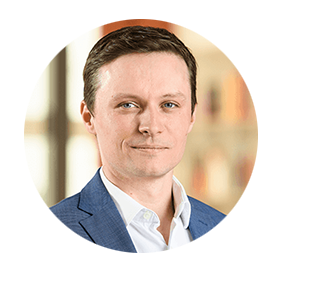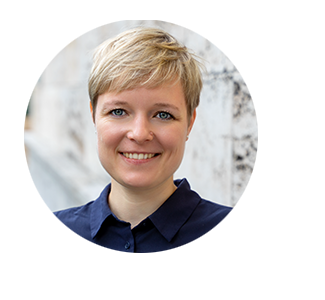

From tank to lab: how we want to advance co-creation
by Roderick Kefferpütz and Claire Luzia Leifert
In the first and second articles of this series, we highlighted the external and internal challenges that think tanks face, ranging from staff development and diversity to questions around impact and innovation. We recognize that solving all these challenges won’t happen overnight but addressing them is a start. And addressing them together is better than doing it on our own. That’s why in our third and final article, we want to take the opportunity to share how we aim to support the co-creative advancement of the German think tank landscape with the Think Tank Lab.
From tank to lab
Definition of tank:
- A usually large receptable for holding, transporting, or storing liquids.
- An enclosed heavily armed and armored combat vehicle that moves on tracks.
- A prison cell.
Looking at that definition, you would be forgiven for wondering why many policy research institutes chose to call themselves think tanks. In fact, the term has its roots in World War II, where it was used to describe a safe space where strategies could be debated. In today’s complex, information-saturated and fast-paced environment, it indeed remains important for think tanks to provide a safe space for political strategizing.
It is open and diverse spaces that have some of the highest proclivity to innovation and the spread of new ideas.
However, as noted in our last blog post, it is important to step out of the 20th century wartime and post-war thinking that gave rise to the label, to redefine ourselves for the 21st century, especially when it comes to avoiding groupthink and facilitating policy innovation, as Anne-Marie Slaughter, Director of New America, argued convincingly. Similarly, Robin Niblett, Director of Chatham House, highlighted the need for think tanks to engage new communities in order to become incubators for policy innovation. After all, it is open and diverse spaces that have some of the highest proclivity to innovation and the spread of new ideas.
Welcome to the Think Tank Lab!
By strengthening peer learning and advancing community-building, offering trainings to think tank employees, crowdsourcing good practices, as well as testing new approaches to impact-oriented think tanking, our aim is to support the future development of the German think tank landscape. We have therefore built the Think Tank Lab around three pillars.
The first pillar is the Community of Practice. We believe that think tanks can learn a lot from each other – and that, together, we can have greater impact. We are therefore building a community of practice to support peer learning and cooperation within and between think tanks. We will do so by organizing regular community events and an annual flagship conference, all of which will provide opportunities for think tankers to come together and discuss the latest trends in think tanking. The Community of Practice is the space to come together with fellow think tankers across organizational and topical boundaries to discuss trends, discover opportunities and find answers to the external and internal challenges that we as think tanks face, regardless of the policy area we work in.
We want to research, experiment and co-create new tools and methods for think tanking.
As a lab, we also want to research, experiment and co-create new tools and methods for think tanking. That’s why, in our pilot phase, based on the output from numerous workshops, we have set up community challenges on two internal issues that think tanks often struggle with. In the first challenge, think tankers will consider how best to promote diversity in our workforce and conference panels – an issue where the participants of our focus group workshops saw plenty of room for improvement. In the second challenge, we will co-create tools to support onboarding processes for new think tankers, as we have found that new colleagues often struggle to navigate the think tank business and have difficulties finding their prospective role. With the community challenges we want to experiment with ways how to bring think tankers across organizations together to work on systemic challenges.
The second pillar of our work is the Think Tank School, which aims to offer further training for think tank staff. We believe that helping think tank staff exploit their full potential is key to delivering innovative analysis and ensuring the future impact of think tanks. Our Think Tank School is a unique training program designed to empower the next generation of think tankers by expanding their skills and networks. It is built on a competency framework which we developed in conversation with think tankers and adult education professionals. It consists of trainings on issues from policy analysis and storytelling to foresight, project management and fundraising.
Sharing good practice
And of course, we want to share our findings, lessons learned, and experiences with the wider community. That’s why our third pillar is a Think Tank Toolbox. Everything we learn, good practices that we come across, and useful information and tools we find out about in our events, workshops and trainings, we will put together in a toolbox. With this we want to ensure that the good work done by think tanks across Germany is accessible for all think tanks and think tankers, so that our collective impact for evidence-informed policy and public debate can be increased.
Our approach
We understand the Think Tank Lab as a place of engagement, learning and community. Our approach is co-creative. We are curious to learn from your experiences and build new knowledge together.
Get in touch!
Do you have an idea or a challenge that you would like to cooperate on? You’ve tried something new and think others should know about it? Or you’d like to join the next cohort of the Think Tank School? Don’t hesitate to get in touch and drop us a line under [email protected]. Also, don’t forget to follow us on Twitter and sign up for our mailing list to receive invitations to future events and be the first to hear about our publications.
Roderick Kefferpütz
Senior Analyst at MERICS

Roderick Kefferpütz is a Senior Analyst at MERICS focusing on Germany’s China policy, Sino-Russian relations and China’s role in a changing global order. He heads the MERICS Lab, which generates new ideas for innovative think-tank work through exchanges with MERICS experts and external partners. Before joining MERICS, Kefferpütz was Deputy Head of Unit for Strategy at the State Ministry of Baden-Württemberg. Prior to that he worked ten years in Brussels, amongst others as chief of staff to MEP Reinhard Bütikofer, Chair of the European Parliament’s Delegation to China. Kefferpütz began his professional career with research positions at the Heinrich Böll Foundation offices in Moscow, Warsaw, and Brussels.
Claire Luzia Leifert
Head of the Impact & Innovation Lab at the German Council on Foreign Relations (DGAP)

Claire Luzia Leifert founded and heads DGAP’s Impact & Innovation Lab, a learning and experimentation space for new approaches to policy advice and public engagement with international politics. She currently also heads the Think Tank Lab, a community of practice and training program for think tankers throughout Germany. Until 2020, Leifert headed the Goerdeler Kolleg for Good Governance, a professional development program and network for public intrapreneurs from Eastern Europe. Before joining DGAP in 2015, she worked at the Heinrich Böll Foundation as a project manager in the fields of social and health policy and education and science policy. Since 2006, she has been a freelance trainer and facilitator in Germany and abroad, focusing on democracy and active civil society, public sector innovation, and organizational development for NGOs and think tanks.